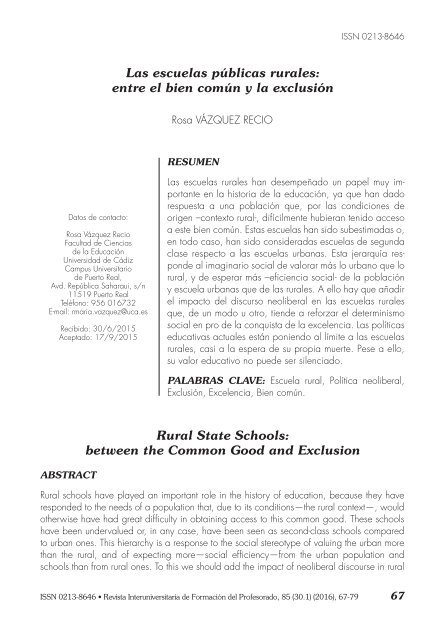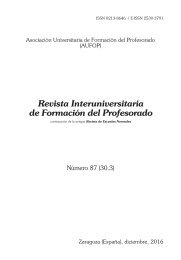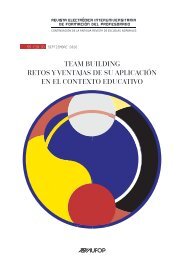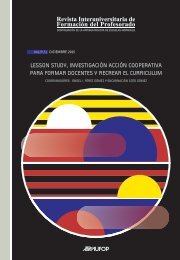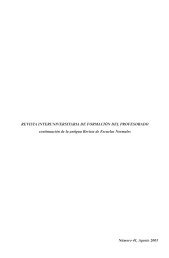SU IMPORTANCIA Y SU SENTIDO
SZ1QUjWc
SZ1QUjWc
Create successful ePaper yourself
Turn your PDF publications into a flip-book with our unique Google optimized e-Paper software.
ISSN 0213-8646<br />
Las escuelas públicas rurales:<br />
entre el bien común y la exclusión<br />
Rosa VÁZQUEZ RECIO<br />
RE<strong>SU</strong>MEN<br />
Datos de contacto:<br />
Rosa Vázquez Recio<br />
Facultad de Ciencias<br />
de la Educación<br />
Universidad de Cádiz<br />
Campus Universitario<br />
de Puerto Real,<br />
Avd. República Saharaui, s/n<br />
11519 Puerto Real<br />
Teléfono: 956 016732<br />
E-mail: rmaria.vazquez@uca.es<br />
Recibido: 30/6/2015<br />
Aceptado: 17/9/2015<br />
Las escuelas rurales han desempeñado un papel muy importante<br />
en la historia de la educación, ya que han dado<br />
respuesta a una población que, por las condiciones de<br />
origen –contexto rural-, difícilmente hubieran tenido acceso<br />
a este bien común. Estas escuelas han sido subestimadas o,<br />
en todo caso, han sido consideradas escuelas de segunda<br />
clase respecto a las escuelas urbanas. Esta jerarquía responde<br />
al imaginario social de valorar más lo urbano que lo<br />
rural, y de esperar más –eficiencia social- de la población<br />
y escuela urbanas que de las rurales. A ello hay que añadir<br />
el impacto del discurso neoliberal en las escuelas rurales<br />
que, de un modo u otro, tiende a reforzar el determinismo<br />
social en pro de la conquista de la excelencia. Las políticas<br />
educativas actuales están poniendo al límite a las escuelas<br />
rurales, casi a la espera de su propia muerte. Pese a ello,<br />
su valor educativo no puede ser silenciado.<br />
PALABRAS CLAVE: Escuela rural, Política neoliberal,<br />
Exclusión, Excelencia, Bien común.<br />
ABSTRACT<br />
Rural State Schools:<br />
between the Common Good and Exclusion<br />
Rural schools have played an important role in the history of education, because they have<br />
responded to the needs of a population that, due to its conditions—the rural context—, would<br />
otherwise have had great difficulty in obtaining access to this common good. These schools<br />
have been undervalued or, in any case, have been seen as second-class schools compared<br />
to urban ones. This hierarchy is a response to the social stereotype of valuing the urban more<br />
than the rural, and of expecting more—social efficiency—from the urban population and<br />
schools than from rural ones. To this we should add the impact of neoliberal discourse in rural<br />
ISSN 0213-8646 • Revista Interuniversitaria de Formación del Profesorado, 85 (30.1) (2016), 67-79 67


